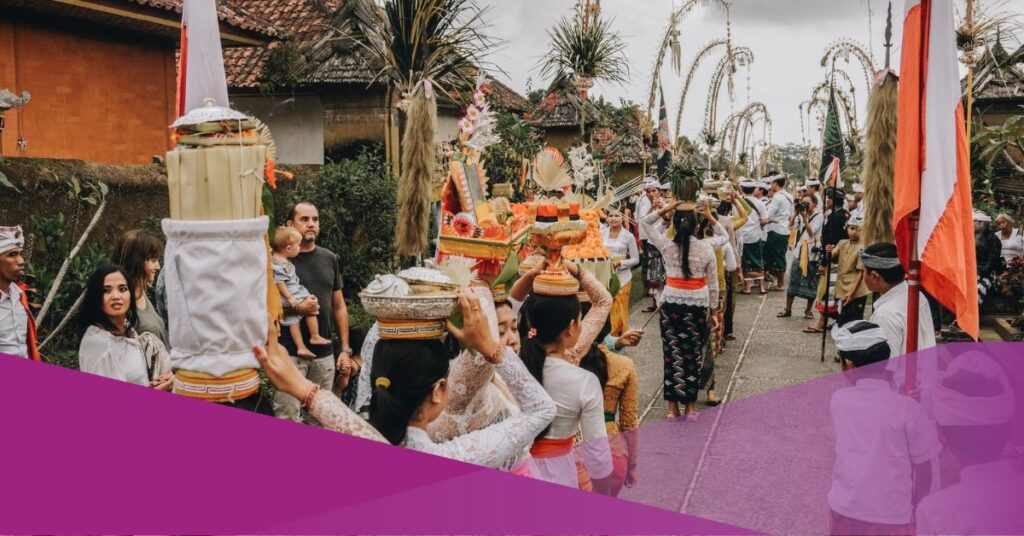Tri Hita Karana is a traditional Balinese philosophy that promotes harmonious relationships between humans, the environment, and the spiritual world. This philosophy recognises that achieving a sustainable and peaceful existence requires a delicate balance of the three core elements.
It reflects the Balinese belief that everything in the universe is interconnected and that our actions and decisions affect not only ourselves but also the world around us.
Tri Hita Karana has influenced every aspect of Balinese life, including culture, traditions, and daily practice, making it a distinct and necessary part of their identity.
Etymology
Tri Hita Karana is derived from the words “Tri” (three), “Hita” (happiness), and “Karana” (cause). Thus Tri Hita Karana means “Three causes of happiness”.
Tri Hita Karana’s cosmological concept is a philosophy of hard living. In the midst of globalisation and homogenization, this philosophy has a concept that can preserve cultural and environmental diversity.
Essentially, the tri hita karana teachings, emphasise three human relationships in this world. These three interconnected relationships include relationships with fellow humans, relationships with the natural environment, and relationships with God.
The Components of Tri Hita Karana
This philosophy’s components include:
- Sanghyang Jagatkarana (Gods).
- Bhuana
- Manusia (humans)
The elements of Tri Hita Karana are found in the holy book Bagawad Gita (III.10), which reads: “Sahayajnah prajah sristwa pura waca prajapatih anena prasawisya dhiwan esa wo’stiwistah kamadhuk” which means:
“In ancient times Prajapati created humans with yadnya and said: with this you will develop and will become the kamadhuk of your desires.”
Three Causes of Happiness
Humans and God, humans and their natural environment, and humans with each other are the three known causes of happiness in Tri Hita Karana philosophy, as follows:
Human’s Connection with God
Man is God’s creation, and the Atman within him is a spark of the holy light of God’s greatness that gives life to man. According to this viewpoint, humans owe their lives to God.
As a result, every human being must be grateful, devoted, and perpetually prostrate before the Almighty. This gratitude and devotion can be expressed through worship and praise for His greatness, which is as follows:
- By worshipping and carrying out His orders.
- By carrying out Tirtha Yatra or Dharma Yatra, namely visits to holy places.
- By practising Yoga Samadhi.
- By studying, living, and practising the teachings of religion.
Humans and Their Natural Environment
Humans exist in a specific environment. Humans obtain their basic needs from their surroundings. As a result, humans are extremely reliant on their surroundings. As a result, humans must always be aware of the situation and conditions in their surroundings.
The environment must always be protected and not destroyed. The environment should be kept clean and tidy at all times. Nature should not be polluted or harmed. Forests cannot be cut down completely, and animals cannot be hunted at will because it will disrupt the natural balance.
The environment must be kept clean, harmonious, and long-lasting. A neat and clean environment fosters beauty. The beauty of the environment can instil in humans a sense of calm and serenity.
Humans and Each Other
Humans, as social beings, cannot live alone. They require the assistance and cooperation of others. As a result, their relationship should always be positive and harmonious.
Human relationships must be governed by mutual honour, mutual compassion, and mutual care, which means mutual respect, love, and support. At home, family relationships must be harmonious. Relations with other communities must be harmonious as well.
This positive relationship will bring about social security and inner and outer peace. A secure and peaceful society will result in a secure and prosperous country.
Tri Hita Karana in Balinese Life
Many aspects of Balinese life are guided by the principle of Tri Hita Karana, from daily rituals to communal gotong-royong cooperation practises to spatial organisation in Balinese architecture.
It is also reflected in the natural irrigation system known as subak on the island, which is made up of cooperatively managed weirs and canals that draw from a single water source.
Want to fulfil your deeper curiosities about Bali and its surroundings? Check out these articles below:





































